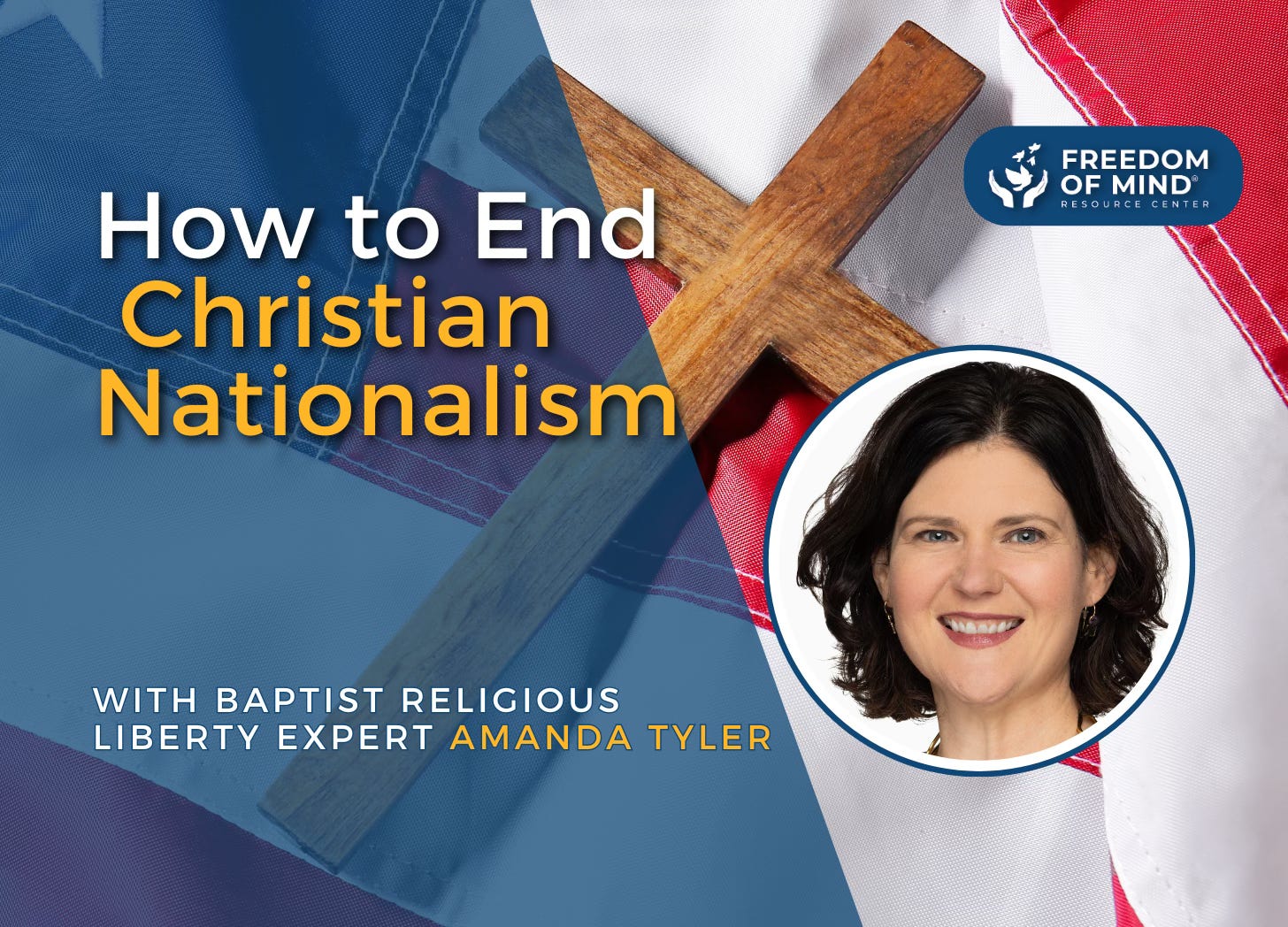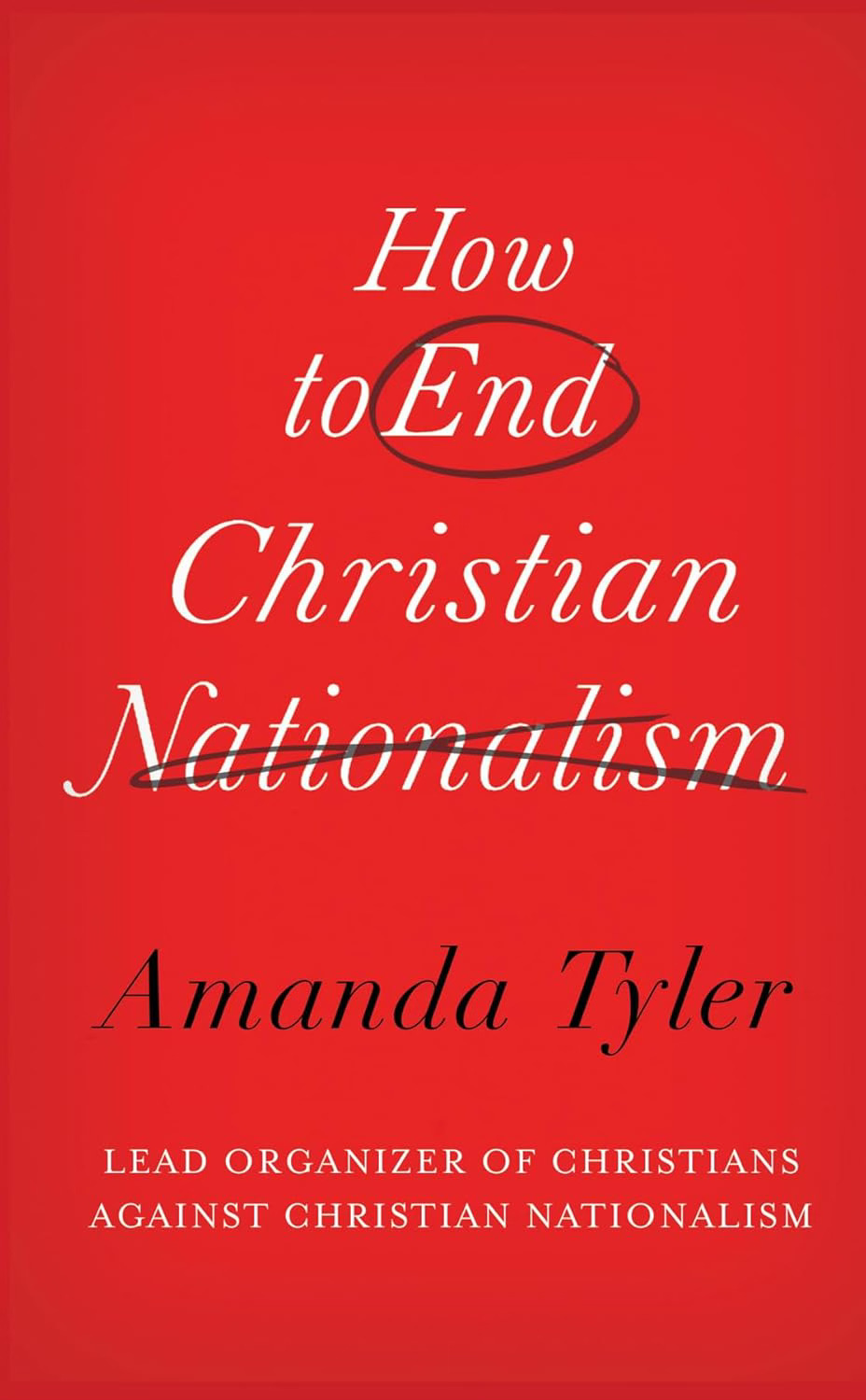My latest guest on The Influence Continuum was Amanda Tyler, a graduate of Georgetown University and The University of Texas School of Law, who has practiced privately as an attorney, as a law clerk for a U.S. district court judge in Dallas, Texas, and at various positions within the federal level. She is currently the Executive Director of BJC ( Baptist Joint Committee for Religious Liberty). Her new book is titled How to End Christian Nationalism.
Amanda’s work has focused on constitutional law analysis and advocacy for ‘faith freedom for all,’ on which topics she has testified before Congress. She defined Christian nationalism as “a political ideology and a cultural framework that tries to merge American and Christian identities.” She based her foundation for religious freedoms squarely on the First Amendment, which stated, “Congress shall make no law respecting an establishment of religion or prohibiting the free exercise thereof.” During our conversation, she shared her legal analysis and religious freedom advocacy perspective, highlighting that this scenario is currently threatened by Christian nationalism in the United States.
Dispelling the Myths of American Divine Christian Inspiration
We discussed the mythology that the United States was founded as a Christian nation. “Christian nationalism tells the story that to be a true American, one has to be a Christian, and not just any kind of Christian, but a certain kind of Christian who holds fundamentalist religious beliefs that are often in line with certain conservative political priorities,” Amanda said. She further described the myths that “God’s providential hand has been guiding America throughout history, and that God has a special role for America and God’s plan for the world.” She noted in this myth that documents become labeled as “divinely inspired,” and that the actual secular or cognitively inspired nature of America’s founding is swept away under stories of Christian nationalism.
Co-opting Religious Messages and Symbols
As a Baptist, Amanda noted her strong attachment to principles from the biblical Book of Genesis, where her belief rests on the idea that “God created free beings.” She discussed the concept of Believer’s baptism, whereby the choice to undergo the baptism must be made by an adult who can make a conscious and informed decision within the faith. To force a religion on a person or nation, such as is being attempted under Christian nationalism, is oppositional to the concepts of biblical interpretations of faith and freedom.
We then conversed about how Christian nationalism denigrates other faiths, such as Judaism, by reducing it to a modifier of Christianity and co-opts symbols such as the shofar and Jericho marches. It also has used Jesus as a mascot and proposed Trump as a Jesus figure of some sort. “We can see how religion is used as a prop for Christian nationalism in a way that really harms authentic faith,” Amanda said.
Laying Down Groundwork for Election Denialism
On the question of how Christian nationalism has desecrated the idea of symbols and divine prophecy, for example, she stated, “There we have lots of examples of false prophets throughout history and using again this, this biblical language, this biblical tradition of prophecy and to use it for these political aims is really a danger to our democracy.” She noted concerns about Christian nationalists laying the groundwork for election denialism based on false prophecy and idolatry. As Amanda pointed out, in the United States, “Prophets don’t determine who wins elections. Voters determine who wins elections.”
Influence Continuum© Review
We took a moment to review my Influence Continuum© model, noting many of the essential ideas that underline the checks and balances of a Democratic system, keeping it free from Authoritarian control. We discussed the ideas of informed consent and ethical behaviors within religious constructs and noted an absence of fear-based indoctrination. “Faith should be faith. It should be love-based, not fear-based,” I noted. Amanda replied that diverse ideologies are crucial, but she said, “What’s not allowed is for any of those traditions to take over the government and impose their way of understanding and following God on everyone else.”
Understanding Civics and Actions to End Christian Nationalism
Understanding the separation of church and state and the basics of civics education is a primary focus of prevention strategies Amanda recommends for initial steps to end Christian nationalism. I noted our previous interview with Louise Dubé, the chief executive officer of the organization iCivics.org, and their excellent tools with hundreds of free resources on this topic. We discussed the concerns that public schools were not providing this level of civics education and, on some levels, that this was “by design” in certain areas, as Amanda noted.
She also brought up the need to curb the threats to public schools as a whole and ensure that education remains a secular pursuit within those institutions. I reminded listeners of the importance of remaining active and informed on local school boards as an essential step. We discussed the need to vote up and down the ballot and keep an eye on free and fair elections. Amanda noted that Christian nationalism will take many election cycles and perhaps decades to protect our governance from authoritarian theocracy. She urged all Christians to recognize the privilege their religion holds as part of the national majority, emphasizing the importance of speaking out against Christian nationalism whenever it appears.
I applauded the importance of Amanda’s work, as she is calling out that Christian nationalism is, in reality, a minority view in America today. “Part of our goal is to normalize talking out against Christian nationalism,” said Amanda, “…I think it’s really incumbent on other Christians to be taking a leading role in speaking out against Christian nationalism because we can speak most authentically about how it’s a distortion to Christianity itself.” We wrapped up our discussion by discussing the importance of tapping into the concepts of building community and diversity and finding real-world connections, support, and hope.
Resources:
The Baptist Joint Committee for Religious Liberty
How to End Christian Nationalism
Amanda Tyler biography - BJC (bjconline.org)
BJC - Respecting Religion Podcast
Respecting Religion on YouTube
Social Media:
Instagram endchristiannationalism




